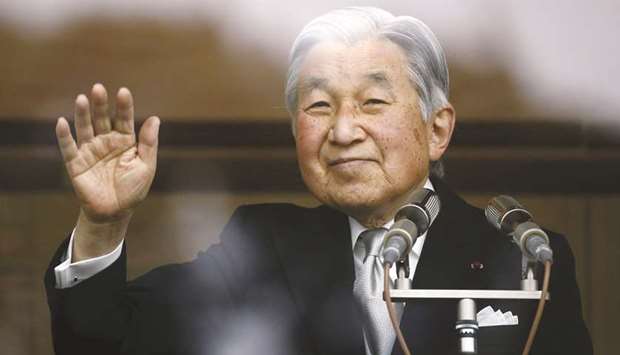The Japanese parliament yesterday enacted a one-time law to allow Emperor Akihito to renounce the Chrysanthemum throne.
Akihito, 83, who has suffered several bouts of ill health in recent years, will become the first emperor to abdicate in about 200 years.
Emperor Kokaku did so in 1817. The government will decide the timing of the abdication within three years and the law is specifically designed for the current emperor and will not allow future monarchs to relinquish the throne.
“A stable succession of the imperial throne is a momentous issue. The government will advance debate with respect for the resolution,”
Prime Minister Shinzo Abe told reporters following the passage of the legislation. Japanese media reported the government is considering December 2018, when the emperor will turn 85, as a possible date for his handover of the throne to Crown Prince Naruhito, 57, his eldest son. The enactment of the law came 10 months after the popular emperor indicated his apparent wish to abdicate in a rare video message,
saying he was concerned that his advanced age might one day prevent him from fulfilling his duties.
Japan’s emperor serves as a “symbol of the state and of the unity of the people,” according to the constitution, but does not hold any political power, meaning that it would be legally and politically impossible for Akihito to discuss abdication directly.
The emperor’s message in August prompted Prime Minister Shinzo Abe’s government to commission a panel to study the abdication issue.
Akihito ascended to the throne in January 1989 following the death of his father Hirohito. Japan’s imperial family claims the longest hereditary lineage in the world, going back more than 2,600 years. The issue of the shrinking imperial family was brought back into the spotlight in May, when the palace confirmed media reports about Princess Mako’s planned engagement with her commoner boyfriend, a former university classmate.
Mako is Akihito’s first grandchild and the older daughter of Prince Akishino, Naruhito’s younger brother. Female members of the imperial family lose their status as members of the household if they marry non-royals, and Mako’s marriage will reduce the imperial family to just 18 members. Mako’s younger brother, Prince Hisahito, 10, is the only male member of their generation. Crown Prince Naruhito’s only child is a daughter, 15-year-old Princess Aiko, but women are not allowed to accede to the throne.
On Thursday, the upper house special committee adopted a non-binding resolution attached to the legislation calling for the government to launch debate on allowing female members to establish their own branches and remain in the imperial family even after their marriage to commoners.

In this file picture, Emperor Akihito waves to well-wishers at the Imperial Palace in Tokyo.
